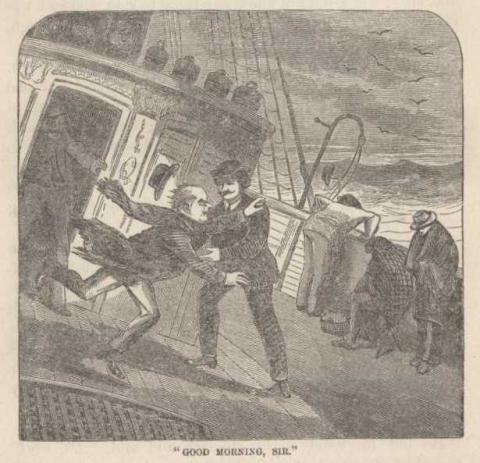June 10 - 29, 1867: Aboard the Steamship Quaker City
Fair Winds: Taking it “by and large,” as the sailors say, we had a pleasant ten days’ run from New York to the Azores islands—not a fast run, for the distance is only twenty-four hundred miles, but a right pleasant one in the main. True, we had head winds all the time, and several stormy experiences which sent fifty percent of the passengers to bed sick and made the ship look dismal and deserted—stormy experiences that all will remember who weathered them on the tumbling deck and caught the vast sheets of spray that every now and then sprang high in air from the weather bow and swept the ship like a thunder-shower; but for the most part we had balmy summer weather and nights that were even finer than the days.
From One of the Captains: There they are, down there every night at eight bells, praying for fair winds—when they know as well as I do that this is the only ship going east this time of the year, but there's a thousand coming west—what's a fair wind for us is a head wind to them—the Almighty's blowing a fair wind for a thousand vessels, and this tribe wants him to turn it clear around so as to accommodate one—and she a steamship at that! It ain't good sense, it ain't good reason, it ain't good Christianity, it ain't common human charity. Avast with such nonsense!
Celestial Mechanics, Ship's Time and Seasickness: We had the phenomenon of a full moon located just in the same spot in the heavens at the same hour every night. The reason of this singular conduct on the part of the moon did not occur to us at first, but it did afterward when we reflected that we were gaining about twenty minutes every day because we were going east so fast—we gained just about enough every day to keep along with the moon. It was becoming an old moon to the friends we had left behind us, but to us Joshuas it stood still in the same place and remained always the same. [See attached page "A Full Moon"]
Young Mr. Blucher, who is from the Far West and is on his first voyage, was a good deal worried by the constantly changing “ship time.” He was proud of his new watch at first and used to drag it out promptly when eight bells struck at noon, but he came to look after a while as if he were losing confidence in it. Seven days out from New York he came on deck and said with great decision:
“This thing’s a swindle!”
“What’s a swindle?”
“Why, this watch. I bought her out in Illinois—gave $150 for her—and I thought she was good. And, by George, she is good onshore, but somehow she don’t keep up her lick here on the water—gets seasick may be. She skips; she runs along regular enough till half-past eleven, and then, all of a sudden, she lets down. I’ve set that old regulator up faster and faster, till I’ve shoved it clear around, but it don’t do any good; she just distances every watch in the ship, and clatters along in a way that’s astonishing till it is noon, but them eight bells always gets in about ten minutes ahead of her anyway. I don’t know what to do with her now. She’s doing all she can—she’s going her best gait, but it won’t save her. Now, don’t you know, there ain’t a watch in the ship that’s making better time than she is, but what does it signify? When you hear them eight bells you’ll find her just about ten minutes short of her score sure.”
The ship was gaining a full hour every three days, and this fellow was trying to make his watch go fast enough to keep up to her. But, as he had said, he had pushed the regulator up as far as it would go, and the watch was “on its best gait,” and so nothing was left him but to fold his hands and see the ship beat the race. We sent him to the captain, and he explained to him the mystery of “ship time” and set his troubled mind at rest. This young man asked a great many questions about seasickness before we left, and wanted to know what its characteristics were and how he was to tell when he had it. He found out.
Sea Life: We saw the usual sharks, blackfish, porpoises, etc., of course, and by and by large schools of Portuguese men-of-war were added to the regular list of sea wonders. Some of them were white and some of a brilliant carmine color. The nautilus is nothing but a transparent web of jelly that spreads itself to catch the wind, and has fleshy-looking strings a foot or two long dangling from it to keep it steady in the water. It is an accomplished sailor and has good sailor judgment. It reefs its sail when a storm threatens or the wind blows pretty hard, and furls it entirely and goes down when a gale blows. Ordinarily it keeps its sail wet and in good sailing order by turning over and dipping it in the water for a moment. Seamen say the nautilus is only found in these waters between the 35th and 45th parallels of latitude.
See Page 396-7 The Life of Mark Twain: The Early Years, 1835-1871:
